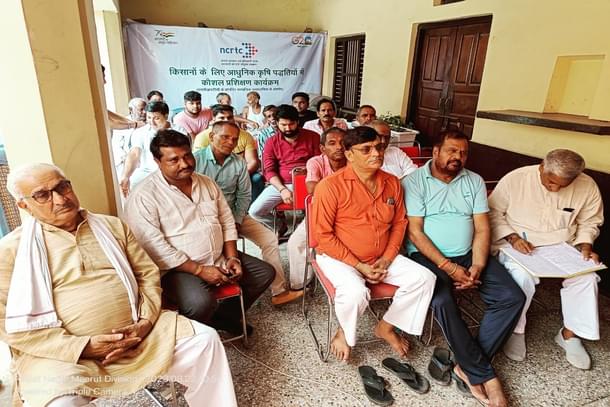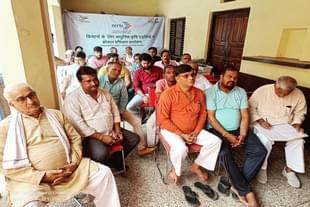Infrastructure
Delhi-Meerut RRTS: NCRTC Organises Training Programmes For 1,500 Farmers Across Corridor's Districts
Arun Kumar Das
Jan 24, 2024, 10:18 AM | Updated 10:18 AM IST
Save & read from anywhere!
Bookmark stories for easy access on any device or the Swarajya app.


Aiming at imparting knowledge of contemporary agricultural techniques, NCRTC is conducting a skill development training programme for farmers in Ghaziabad and Meerut districts.
A group of agricultural specialists is delivering training sessions to farmers in these regions, focusing on modern farming practices.
The initiative, spearheaded by National Capital Region Transport Corporation (NCRTC), signifies a crucial stride in advancing skill development and providing training on cutting-edge agricultural technologies for farmers.
In the second phase of the training programme, agricultural specialists conducted skill development sessions for farmers in Anjuli Soharka, Kayasth Gavadi, Mujakipur Shopura, and Dindla villages in Meerut.
The training focused on imparting modern agricultural techniques, with active participation from women farmers in these sessions.
Over the next three months, a comprehensive series of over 100 training sessions is scheduled to be conducted for more than 1,500 farmers across 50 villages.
These villages include Mehrauli, Mohiuddinpur, Kalinjari, Dirmoli, Jurrampur, Solana, Pawanpuri, Vasundhara, Bandipur, Shahjahanpur, Kilonda, Niwari, Patla, Bhajan-Patola, and Modi Bagh.
The skill development programme aims to benefit farmers situated near the Delhi-Ghaziabad-Meerut RRTS corridor.
It's noteworthy that in the initial phase of this initiative, more than 1,500 farmers have already undergone training in modern agricultural practices.
NCRTC is taking a step further by establishing a modern farming demonstration centre at the RRTS Depot in Duhai. This centre will feature poly-houses dedicated to showcasing modern farming techniques, particularly those based on hydroponics technology.
Farmers visiting the centre will receive valuable information on innovative farming methods. The aim is not only to enhance the quality of agricultural produce, but also to align with government policies that seek to boost farmers' income through the adoption of advanced technologies.
With the rapid urban development, the available land for agriculture is gradually diminishing. This change has resulted in increased pressure to produce more to meet the altered food requirements of the growing population.
Consequently, the NCRTC has recognised this evolving landscape and the needs of farmers in this area. As a response, they have decided to provide training in modern, high-yield urban agricultural techniques, which can offer higher returns per unit of land.
Currently, farmers typically adopt traditional farming methods, leading to lower income per unit area.
These new-age farming practices such as poly-house farming, drip irrigation farming, retractable greenhouse farming, hydroponics, etc. are not only environmentally and socially sustainable but also urban farming techniques.
Moreover, unlike traditional farming techniques, they require less water and are not heavily reliant on weather conditions which can help minimise the impact of adverse weather on crops.
Besides, these new-age farming techniques are comparatively less labour-intensive. It makes it easier for women to contribute more to it and provides an option for their increased income, leading towards their financial freedom and empowerment.
The increasing demand for nutrient-rich and organic produce in the region creates an opportunity for farmers to improve their livelihoods by selling their quality produce.
The skill development and training programmes are being organised under the corporate social responsibility (CSR) programme of NCRTC.
Prime Minister Narendra Modi inaugurated the priority section of Delhi-Ghaziabad-Meerut RRTS Corridor, between Sahibabad to Duhai in October 2023 and flagged off the first Namo Bharat train.
The additional 25 km section from Duhai to Meerut South Station is undergoing trial runs and soon the Namo Bharat services will be operational in this section, making a 42 km stretch available for passengers from Sahibabad to Meerut South.
The goal is to operationalise the entire corridor, from Delhi's Sarai Kale Khan to Modi Puram in Meerut, by June 2025.





